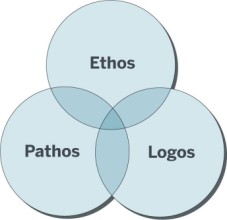A great ideas is only one component of the persuasion cocktail
So, you have a great idea and you are convinced that everyone will readily recognize it as such. Think again!
As this TED-Ed (What Aristotle and Joshua Bell can teach us about persuasion) brilliantly demonstrates it, persuasion takes more than just idea/argument greatness.
The quick video recounts the story of the famed virtuoso violinist Joshua Bell who, 3 days after a much acclaimed performance at a packed Boston Symphony Hall, decided to play for an audience of… nobody. That performance was taking place in the subway station where barely a handful of people slowed down to listen to his music. People were actually ignoring him.
What happened?
Same music played by the same musician, with the same passion, on the same violin?
Conor Neill (the author of the TED-Ed video) tells us that Aristotle would have been able to explain… more than 2300 years ago!
Aristotle’s time-tested 3-part persuasion recipe
What does it take to convince people? That’s the topic of Aristotle’s Rhetoric and it boils down to the 3 means of persuasion: logos, ethos and pathos.
- Logos: does the idea/argument makes sense to the audience, from the audience’s point of view? Does it follow a certain logic, the same way that good music follows certain good composition rules? Is the idea relevant to the audience?
- Ethos: Ethos is all about reputation, credibility, acting professionally, and being trustworthy. Do you care about the audience as much as yourself? Do you convey a sense of authority: a mix of confidence with a concise/clear message
- Pathos: Pathos is the emotional connection. Stories are a potent human tool to create an emotional connection. Sometime, the audience is not ready to hear your message/idea. A good speaker creates the right emotional environment for his/her message to connect with the audience.
What happened to Joshua Bell and what often happens to us when we try to sell our ideas is that we may have a great logos, but ethos and pathos are missing.
In the case of Joshua, the subway station didn’t convey the same sense of trustworthiness that a concert hall does (ethos). The emotional bond between the well-light, lone violinist on stage and his concert hall audience didn’t exist in the hustle and bustle of the busy/noisy subway station (pathos).
So, the next time you try to sell your next great idea, how will you build credibility and emotional connection?
PS: Have you been in the same predicament as Joshua Bell? Any tips on how to work up an awesome ethos/pathos like nobody’s business? Share it by leaving a comment below.
You like the post? “Like it” on your favorite social network(s) below.

It’s very humbling to realize how much of what ancient poets and philosophers wrote is still so relevant today. I’m astounded by how people in antiquity must have been very different from us in so many obvious ways and yet how similar they were in such fundamentally human ways. As the owner of the Greek diner in The Muppets Take Manhattan movie said, “Peoples is peoples.”
I don’t necessary agree with the explanation of Joshua Bell’s experiment. It seems it lays the responsibility of getting unnoticed on his actions or on what he did not do. For me what he was trying to ask was are human being able to see beauty and appreciate it freely ? sometime we buy things or we like things because it is popular or because paying $$ means “it must be really worth it” that is the condition that Bell was trying to display. Culture also plays a part , had he done the same experiment in Vienna he would have had a vastly different result , Viennese know and appreciate their classical music 🙂
First of all, thank you for the excellent comment, Aghyan!
I’m with you to some extent. The “it costs beaucoup $$$, and therefore is must be good” attitude seems to be a common characteristic of our fellow US countrymen. That said, and you can blame me on my French upbringing, but I try not to be influence by how much things cost. If it’s crap, I’ll be the first one to say so. Actually, one of my great joys in life is to find, recognize and appreciate the unexpected little pleasures that serendipity throws at us. And yes, that includes the lamenting song of a lonely sax player in the Paris metro…